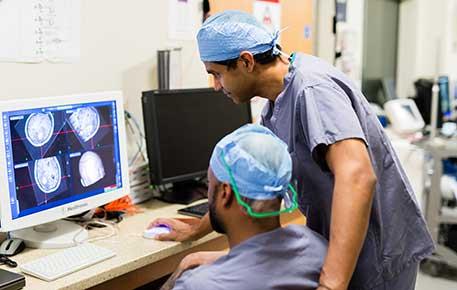Von-Hippel Lindau Disease (VHL) Care
Make an Appointment
Having von Hippel–Lindau disease, or VHL, can be overwhelming. You may develop tumors or cancers in up to 10 different parts of your body, from your brain and spinal cord to your pancreas and kidneys. You don’t need just one trusted provider to treat you; you’ll need several. Where do you start?
At UVA, our providers have the training and expertise to tackle this complex and scary condition.
We’re here to help you:
- Understand what having VHL means and what to expect
- Develop a systematic tumor-surveillance plan
- Prioritize treatment
- Find perspective
We can’t simply remove all the tumors all at once to cure this disease. Effective care for VHL requires knowing when, as well as how, to deliver treatment. It’s our goal to earn your trust and treat you as a whole person, so that we can properly manage your condition together.
VHL: Blood Vessel Tumors Affecting Many Organs
At UVA, we have a highly skilled team of experts in fields as diverse as ophthalmology and genetic counseling, providing care for patients with VHL throughout their life.
ASHOK ASTHAGIRI: VHL or Von-Hippel Lindau disease is a genetic condition characterized by the formation of multiple blood vessel tumors in many organs of the body. These include the eye, pancreas, kidney, lung, liver, and some of what are called the pelvic organs or adnexal organs. We’re one of 10 comprehensive centers in the United States that provide care from birth to older age, so across a personÕs life.
MARTHA THOMAS: About 80 percent of people with VHL actually have a family history of it. So if a parent knows that they have VHL, we would want to make sure that their children are offered testing to see which of their children have it, and sometimes more importantly, which of their children donÕt have it and don’t need that extra surveillance. However, about 20 percent of people with VHL do not have a family history of it, and so most of those patients are identified a little later in life when some of the symptoms start to be diagnosed. The frequency of their screenings is really dependent on their age and their presentation. Typically, we like to see patients annually, but not all screenings are done annually. So that’s where, at those annual appointments, we really individualize an approach based on the clinical presentation as well as the family history.
ASHOK ASTHAGIRI: When treatment is needed, the treatment can really vary from surgery, which really is the backbone for treatment of most of the nervous system tumors, to various types of targeted chemotherapy. Understanding how those individual tumors behave lets us develop an individualized treatment plan.
EUGENE SHILDKROT: Several treatments are available for the lesions of VHL in the eye, depending on the size. If it is a smaller lesion, freezing treatment or laser could be sufficient to control the disease. For larger lesions, we use injection medications similar to those used in macular degeneration or vein inclusion to try to control the exudation.
MICHELLE FLYNN: It’s world class health care. So if you’ve been diagnosed with VHL, you probably already realize you’re going to have to see a number of specialists throughout the course of treatment. Those specialists are right here at UVA. We work with the patient and the patient’s family. Family being defined however the patient defines it. So family can mean your neighbors who are helping you through this process, it can mean your church family, or it can mean those people you’re related to. We could meet with them only when they’re coming for appointments. We could provide telephone support. We could meet with a patient as frequently as weekly or twice a week if that’s what it takes to meet their emotional needs.
Excellence in VHL Care & Logistical Support
We know that having VHL can feel like a lot of work. Because we are a VHL comprehensive clinical care center, you don’t have to do it all alone. We offer a single point of contact who will help coordinate all of your appointments.
We’re recognized by the VHL Alliance as a center of excellence in providing comprehensive care to both pediatric and adult patients with VHL. We also provide genetic counseling for family planning.
VHL Experts Coming Together
VHL can cause tumors throughout your body (also called a multiple neoplasia syndrome). VHL can result in other issues, too, like:
- High blood pressure, due to adrenaline-secreting tumors
- Fertility problems, from tumors on your reproductive organs
- Vision loss, when tumors appear on your retina
The fact that VHL can appear in very different parts of your body makes both diagnosis and treatment challenging.
At UVA, our VHL experts have access to the specialists and resources needed to understand your specific situation. Working together, we can connect the dots when, for instance, VHL causes issues both in your brain and in your pancreas. This team may include expert audiologists, otologists, urologists, oncologists, endocrinologists and pancreas/endocrine surgeons.
- Will I Find Support?
VHL is a rare disease: Only about 1 in 35,000 people born every year have VHL. We’re here to provide you the support of a community of people who understand what you’re going through.
- Will I Get VHL?
If either of your parents have VHL, you have about a 50% chance of inheriting it. We can give you a genetic test to see if you have the specific mutation that causes VHL.
- Are There New Treatments?
We keep up with new research and treatments so that we can best care for you and your family.


